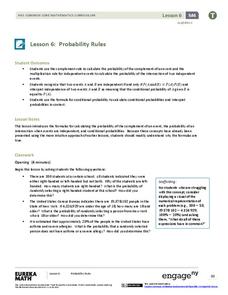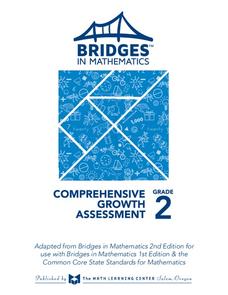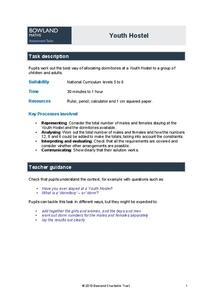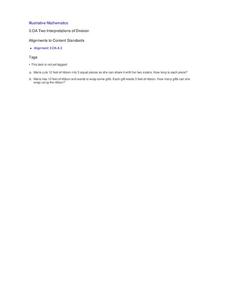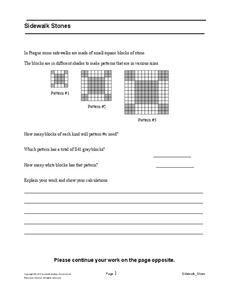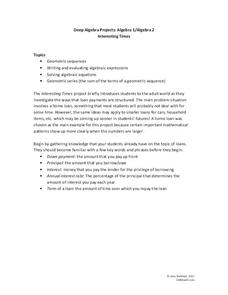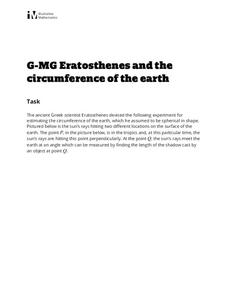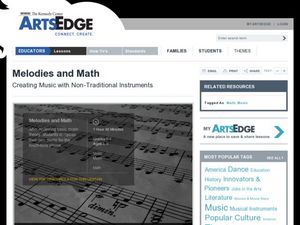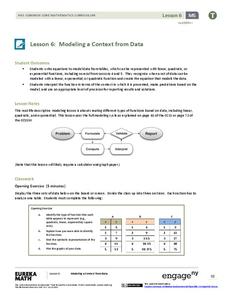EngageNY
Interpreting Quadratic Functions from Graphs and Tables
Seeing functions in nature is a beautiful part of mathematics by analyzing the motion of a dolphin over time. Then take a look at the value of a stock and maximize the profit of a new toy. Explore the application of quadratics by...
EngageNY
Probability Rules (part 1)
In statistics, probability rules—literally! Learners use their previous knowledge and explore a set of rules for conditional probability, independent probability, and complements. Given different scenarios, they must determine what type...
Bridges In Mathematics
Grade 2 Comprehensive Growth Assessment
Need to know if your students comprehend all the Common Core standards covered in second grade? This growth assessment will let you know. Find out if your second graders can add/subtract, tell the time, read a bar graph, know their...
EduGAINs
Making Savvy Consumer Choices
It's never too early to learn about grocery budgeting. Middle schoolers delve into the world of consumer math with a lesson that focuses on both healthy choices and real-world math applications. Groups work together to form a grocery...
101 Questions
Stopping Distances
In 2016, one in every four fatal car crashes listed speeding as a contributing factor. Pupils view videos of a car trying to come to a quick stop from four different rates of speed. They use context clues to measure and determine the...
EngageNY
The Power of Algebra—Finding Pythagorean Triples
The Pythagorean Theorem makes an appearance yet again in this lesson on polynomial identities. Learners prove a method for finding Pythagorean triples by applying the difference of squares identity.
Bowland
Youth Hostel
Given a set of criteria, individuals determine how to arrange males and females in a dormitory. They must meet the requirements and communicate their plan clearly.
American Statistical Association
What Fits?
The bounce of a golf ball changes the result in golf, mini golf—and a great math activity. Scholars graph the height of golf ball bounces before finding a line of best fit. They analyze their own data and the results of others to better...
Illustrative Mathematics
Two Interpretations of Division
Division can be seen in two ways; as splitting a whole into a certain number of pieces, or splitting it into pieces of a certain size. Help your class reach this understanding with these two simple word problems. Encourage the use of...
Illustrative Mathematics
Bank Shot
Young geometers become pool sharks in this analysis of the angles and lengths of a trick shot. By using angles of incidence and reflection to develop similar triangles, learners plan the exact placement of balls to make the shot....
Mathematics Assessment Project
Sidewalk Stones
One block, two blocks, white blocks, gray blocks. In the high school assessment task, learners investigate patterns of sidewalk stones to develop a quadratic expression for each colored block. Young mathematicians then use the expression...
5280 Math
Interesting Times
Gain a little interest in functions with a real-life task. Young scholars analyze home loan data with a geometric sequence and series. They use the models to make predictions about the total loan payments at certain intervals in a...
Illustrative Mathematics
Eratosthenes and the Circumference of the Earth
The class gets to practice being a mathematician in ancient Greece, performing geometric application problems in the way of Eratosthenes. After following the steps of the great mathematicians, they then compare the (surprisingly...
Mathematics Assessment Project
Estimating Volume: The Money Munchers
Don't stuff money under your mattress. To find out why learners first complete a task determining how $24,000 in cash would affect the height of a mattress and whether this same amount would fit into a suitcase of given dimensions....
Radford University
Transformational Graphing in the Real World: Building Bridges
No suspension here, the resource is good to go. Using graphing calculators, scholars explore how transformations affect the graphs of quadratic functions. They consider how the changes relate to the context of suspension bridges.
Radford University
Transformational Graphing in the Real World: Bacteria – Growth or Decay?
Grow—not decay—your knowledge of exponential functions. Young mathematicians graph exponential functions and explore how transformations affect the graphs. They decide whether the functions represent growth or decay in the context of...
Hood River County School District
Text Structure: Features and Organization
Teach learners how to interact with both fiction and non-fiction text with a packet of activities and worksheets. After looking over text structure and the difference in text features between different types of writing,...
Scholastic
Study Jams! Fractions
What can quesadillas teach your class about fractions? More than you might think. AJ and Zoe from the StudyJams! crew use this Mexican cuisine to explain how fractions are just equal parts of a whole, defining the key terms numerator and...
Scholastic
Study Jams! Integers
Stay positive, teaching about integers just got a little easier! Explain how positive and negative numbers are opposites using number lines and real-world examples. The included assessment provides an excellent opportunity to check for...
Curated OER
Melodies and Math: Creating Music with Non-Traditional Instruments
Review the 4/4 and 2/4 time signatures in music with a helpful music theory lesson plan. Young musicians experiment with electronic sounds and create their own musical performance using instruments made from materials found in the...
Curated OER
Math Prefixes
Young scholars use a dictionary to gather appropriate information for writing simple definitions. They recognize prefixes that relate to numbers, such as mono-, bi-, and tri-. Pupils use their creative abilities to extrapolate new words...
Curated OER
What's in a Shape?
Students explore characteristics of shapes by making and using tangram sets. They discover how the tangram pieces are related to one another, and determine how many different combinations of the triangles, squares, and parallelograms in...
College Board
Frozen in Time
Take a closer look at increasing and decreasing behavior by zooming in on graphs. An AP® Calculus reference document examines how increasing/decreasing behavior should be considered in terms of intervals rather than points. The resource...
EngageNY
Modeling a Context from Data (part 1)
While creating models from data, pupils make decisions about precision. Exercises are provided that require linear, quadratic, or exponential models based upon the desired precision.

